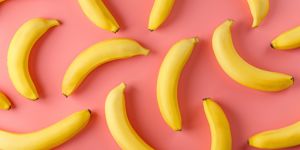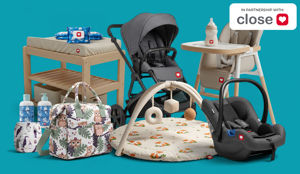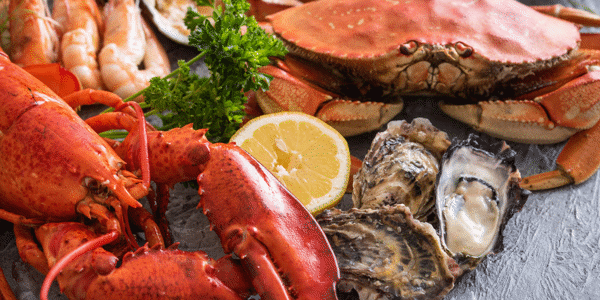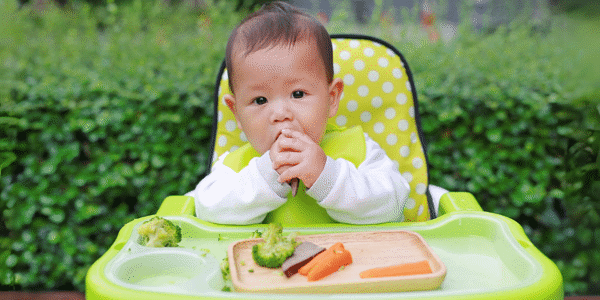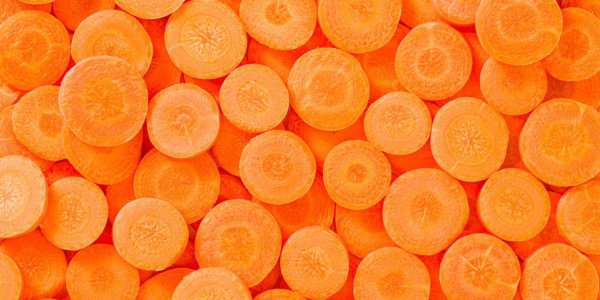From delicious bread to sizzling pancakes, bananas are a sweet and versatile fruit perfect for introducing early on in your baby’s weaning journey.
When Can Babies Start Eating Bananas?
Babies can start eating bananas as soon as they’re ready for solids! This is usually when they’re 6 months old, but it can vary depending on your baby.
Are Bananas Good for Babies?
Bananas are an amazing food to introduce to your baby as they’re packed full of yummy goodness!
They’re:
- A complex carbohydrate, meaning that they’re rich in fibre. They’ll help your little one stay full and energised for longer - yippee!
- An excellent source of potassium. Potassium helps to develop muscles and keep your baby’s blood pressure healthy.
- Full of vitamins (vitamin C and B6 especially). These help to support your baby’s nervous systems and iron absorption.
- Packed with antioxidants - even more so than berries!
Also, if your baby is suffering from diarrhoea, try feeding them a banana. Bananas have a ‘binding’ effect when they’re digested and are shown to help lessen the symptoms of diarrhoea.
Are Bananas a Choking Hazard?
Overall, bananas are not considered a choking hazard if prepared correctly. Make sure you prepare accordingly based on the age of your child to minimise any choking risk.
Can Babies Be Allergic to Bananas?
Luckily, bananas are not a common allergen. This means that it is very, very unlikely that your baby will be allergic to them, but as with everything not impossible.
If your baby does have an allergic reaction to eating bananas, it’ll most likely be a mild one, such as temporary itching and redness around the mouth.
If you’re introducing bananas to your baby for the first time, start with a small amount over a couple of servings to judge their reaction. If your baby seems fine in the hours after eating some bananas, then increase the amount when served next.
How to Safely Prepare Bananas for Baby-Led Weaning
Bananas are a great food to introduce early on in your baby-led weaning journey as they’re generally pretty safe for all ages to munch on if prepared correctly based on their age group.
When choosing which banana to serve your baby, it’s best if the banana is ripe enough that you can easily squish it between your finger and thumb (to a paste) - just like how your baby will with their gums.
Also, give your banana a quick glance over before offering it to your child for any stringy bits. These can get stuck when swallowed and pose a choking hazard.
How to Prepare Bananas for 6-Month-Olds
What you need to remember when serving bananas to 6-month-olds is the bigger, the better!
Your 6-month-old will need big pieces of food that they can grip and bring to their mouth, as they haven’t developed their pincer grip yet
A great way to prepare bananas for 6-month-olds is to offer banana spears. This is when you remove the skin off of a banana, then apply pressure at the tip of the banana with your finger. When enough pressure is applied, the banana will split into three long spears, perfect for little hands to grab.
If your baby is struggling to grip the slippery banana spears, you could try offering a banana ‘lollipop’ instead.
For this, remove the peel off of half a banana, but leave it on the bottom half as a sort of banana handle. This will give your little monkey something solid to hold onto as they explore the banana. Just remember to wash the skin first! And make sure they don’t eat it.
How to Prepare Bananas for 9-Month-Olds
Because 9-month-olds are developing their pincer grip, you can either offer them banana spears (see above), or you can cut the spears into smaller pieces (thirds are best) in order for your baby to practise their newfound grip.
If you and your baby are feeling more adventurous, why not offer your banana with yoghurt? Or as a topping to porridge? Yum!
How to Prepare Bananas for 12-Month-Olds
At this age, it’s safe to offer bite-sized pieces or even whole bananas for your baby to break up and eat themselves.
5 Easy Baby-Led Weaning Recipe Ideas for Bananas
Banana Pancakes
Banana pancakes are a great baby-led weaning way to experiment with bananas in your baby’s diet. They’re easy to hold and are perfect for throwing into the freezer for a quick breakfast at a later date. Recipe from Baby Foodie.
You’ll need:
1 ripe banana
1 egg
2 tbsp of plain flour
Recipe:
- Mash the banana with a fork
- Stir in the egg
- Whisk in the flour into the eggy banana batter
- Cook in a frying pan on a medium-high heat for 3-4 minutes
Banana Porridge Fingers
If you like the idea of banana porridge but want a more baby-led weaning option, banana porridge fingers are great! Easy to make, your baby’s going to love playing with these - and eating them too hopefully! We love this recipe from Cow & Gate.
You’ll need:
3 tbsp of fine-rolled porridge oats
3 tbsps of your baby’s regular milk
½ a banana
Recipe:
- Soak the oats in your chosen milk until soft
- Meanwhile, mash the banana with a fork
- Mix the oats with the mashed banana
- Squish the mixture onto some baking parchment in a shallow ovenproof dish
- Cook for 15 minutes in the oven at 190oC/375oF/fan 170oC/gas mark 5.
- Remove from the oven and cut into finger-shapes at least the length of one adult finger and the width of two adult fingers.
- Allow to cool before serving
Baby’s First Banana Bread
Banana bread is a go-to teatime treat, and now your little one can enjoy it, too! This great recipe is from Mummy Cooks.
You’ll need:
2 ripe mashed bananas
1 beaten egg
2 tbsp melted butter
1 tsp vanilla extract
2 tsp ground cinnamon
200g self-raising flour
50g brown sugar
100g porridge oats
Recipe:
- Preheat the oven to 190°C (375°F) and prepare your silicone muffin tray or baking tray
- In a large bowl, use a whisk to thoroughly combine the mashed bananas, melted butter, egg, and vanilla extract
- In a separate bowl, combine the cinnamon, flour, brown sugar and oats
- Transfer this mixture to the banana mixture and stir until completely combined
- Roll the mixture into bite-sized balls and place evenly on your baking tray
- Bake for 10-15 minutes or until golden brown on the top
- Enjoy by itself or use as a dipper with yoghurt or cream
Banana French Toast
Make your mornings extra special with this delicious banana-esque French toast recipe from My Fussy Eater.
You’ll need:
1 ripe banana
1 egg
20 ml of milk
3 small slices of wholemeal bread
Butter or oil for frying
Recipe:
- Mash the banana with a fork
- Mix the mashed banana with the egg and milk until combined
- Cut the bread into fingers and dip into the mixture
- Melt the butter/oil in a frying pan on a medium heat and fry the dipped bread fingers until golden brown - 1-2 minutes on each side
Banana Muffins
Perfect for on-the-go snacking or a quick lunch, banana muffins are a freezer must-have. Recipe from Organix.
You’ll need:
2 large ripe bananas
150g self-raising flour
1/2 tsp bicarbonate soda
2 eggs
100ml milk
60g butter
Recipe:
- Preheat the oven to 180°c. Grease a 6-cup muffin tin with butter. Add flour and bicarbonate soda to a medium size mixing bowl
- In a separate bowl, lightly whisk the eggs and milk, along with melted butter.
- Mash the bananas using a fork, and then add to the milk and egg mixture
- Pour the mixture into the flour and bicarbonate soda bowl, gently stirring until well combined
- Then divide the baby banana muffin mixture equally between the muffin tin cups
- Bake these baby breakfast muffins for around 20 minutes until lightly golden.
- Then remove from oven, and once cooled enjoy


